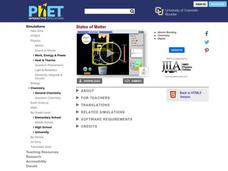PhET
Wave on a String
The sound waves of thunder are made when lightning very quickly heats the air surrounding it, expanding faster than the speed of sound. Learners explore waves through their own movement of string or set waves to constantly oscillate....
PhET
Beer's Law Lab
Beer's Law can be used to measure the concentration of certain compounds in samples of food. In the concentration simulation, particpants change and measure the concentration of different solutions by manipulating various types of...
PhET
Balancing Chemical Equations
Just like the old saying goes, "What goes in must come out." This simulation allows pupils to balance chemical equations. The introduction gives three examples before scholars switch to game mode, pick their level, and continue to...
PhET
Sugar and Salt Solutions
Ionic bonds form from electrostatic energy, allowing for higher conductivity than those seen in covalent bonds. In the simulation, learners add sugar and salt to water and see the effects on concentration and conductivity of their...
PhET
States of Matter
Water is the only molecule on Earth that can naturally exist in all three states of matter. The interactive simulation shows different molecules changing states of matter with the addition or removal of heat. Learners then see how...
PhET
Reactants, Products and Leftovers
Did you know when you mix the reactants sulfur, tungsten, and silver, you get the products SWAg? The simulation begins with making sandwiches, to show pupils reactants and products of something familiar. They then can make water,...
PhET
Radioactive Dating Game
Uranium 235 has a half-life of over 700 million years and is the fuel used in the atomic bomb dropped on Hiroshima, Japan. Pupils see the half-lives and decay rates of Carbon-14 and Uranium-238. They also take measurements of these two...
PhET
Molecule Shapes
The shape of a molecule is determined by the arrangement of atoms around the central atom and lone pairs of electrons. Scholars build models of molecules using single, double, and triple bonds. They can then see real molecules bond...
PhET
Isotopes and Atomic Mass
Some isotopes are unstable, or radioactive, meaning they will decay over time and turn into another isotope or stable element. In the interactive simulation, participants manipulate elements to create isotopes and gather information....
PhET
Molecule Shapes: Basics
In molecules, bonds rotate about the nucleus due to the repulsion of subatomic particles. In a simulation, learners manipulate the bonds of a molecule to meet the atoms' needs. They can then see the specific molecular shapes of five...
PhET
Build a Molecule
How many different molecules can you build? In a simulation, learners make molecules from given atoms. There are numerous collections from which to build three to five molecules from given kits of atoms. Scholars can also view their...
PhET
Acid-Base Solutions
Learners, through watching a simulation, can manipulate various characteristics of different solutions focusing on acid-base solutions where pH, strength of solution, and concentration may be changed. Views may be at the molecular level,...
PhET
Concentration
When no more solute can be dissolved into a solvent, the solution has reached saturation. The interactive simulation allows learners to manipulate a solution in order to measure its concentration. The amount of solvent, the amount and...
PhET
Neuron
Neurons send electrical signals throughout a body based on chemical communication. Individuals stimulate a neuron to see the effects. They notice the sodium-potassium channels along with ions, concentrations, and a membrane potential...
PhET
Rutherford Scattering
Rutherford performed his famous experiment in 1907 with Marsden, showing the true atomic structure. This interactive simulation compares Rutherford's historical experiment to the Plum pudding model of the atom. In both models, alpha...
PhET
Molarity
All chemists know that moles are made of molecules. Individuals see how changes in the amount of solute affect the concentration of the solutions. By manipulating solute amounts (moles), solution volume (liters), and solute types, the...
PhET
Balloons and Static Electricity
Like all electricity, static electricity flows at the speed of light, or 186,282 miles/second. The interactive simulation shows how like charges repel like charges and opposites attract. The user can choose either one or two balloons, a...


















